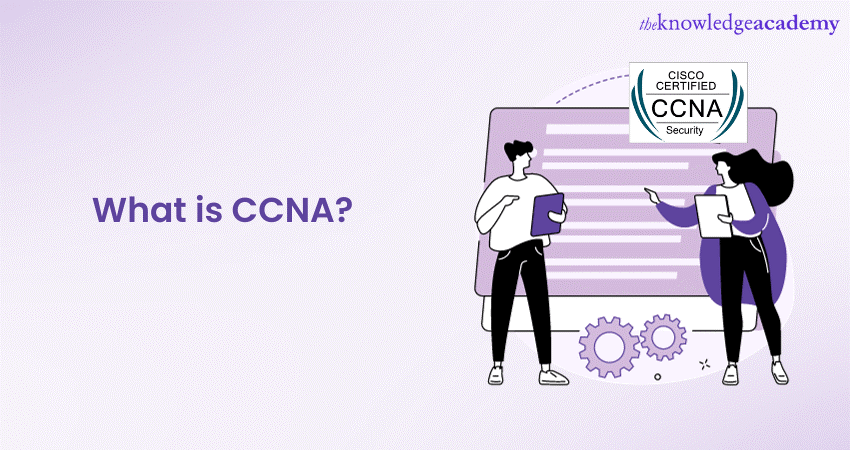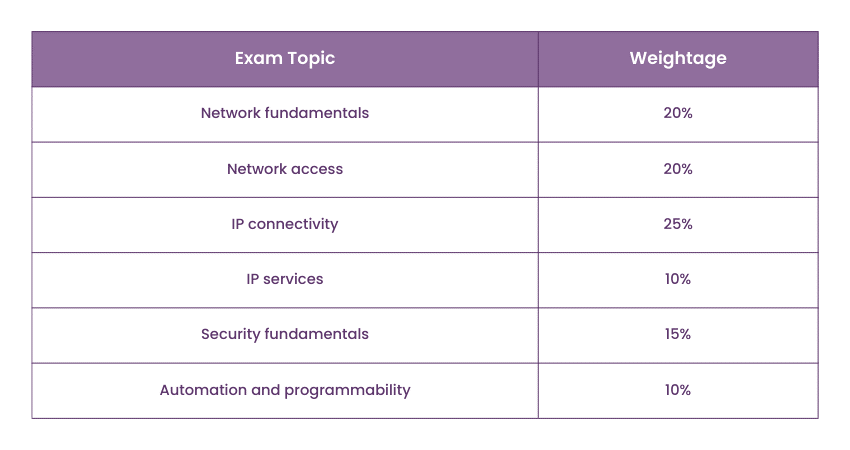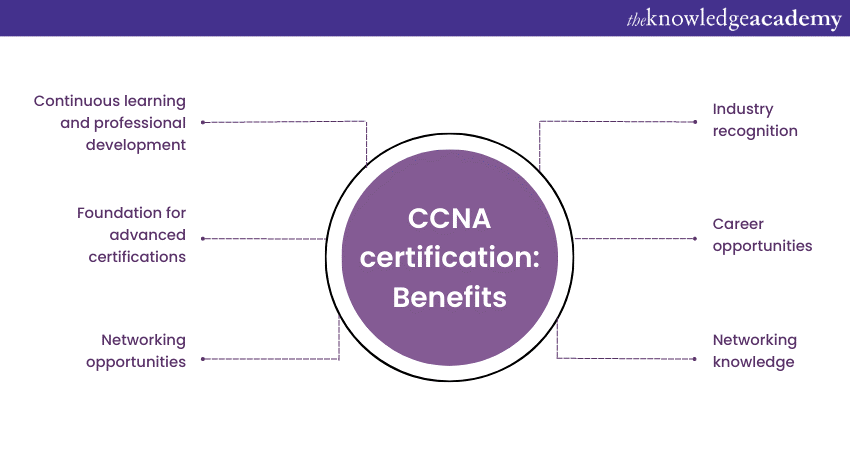We may not have the course you’re looking for. If you enquire or give us a call on 01344203999 and speak to our training experts, we may still be able to help with your training requirements.
Training Outcomes Within Your Budget!
We ensure quality, budget-alignment, and timely delivery by our expert instructors.

In today's fast-paced world, computer networks are the backbone of modern communication. As networking technologies advance frequently, organisations are on the lookout for hiring professionals proficient in maintaining network infrastructure. Aspirants in the Information Technology (IT) field who wish to fill such positions are constantly looking for suitable certifications to pursue, and one of the most-asked questions among them is ‘What is CCNA?’
Cisco Certified Network Associate (CCNA) is a highly respected certification that validates the skills and knowledge required to design, build, and manage networks using Cisco technologies. According to Zippia, CCNA-certified jobs like Network Associate or Analyst are estimated to grow 5% from 2018 to 2028.
In this blog, we will dive into the significance of CCNA, the benefits of acquiring the certification, and explore the wide range of career opportunities.
Table of Contents
1) CCNA – An overview
2) CCNA examination details
3) Benefits of CCNA certification
4) Career opportunities with CCNA
5) Conclusion
CCNA – An overview
Cisco Certified Network Associate or CCNA is a coveted certification offered by Cisco Systems, a global leader in networking technology. The certification offers the knowledge and skills required to operate, troubleshoot, and maintain Cisco networking infrastructure. It serves as a foundation for more advanced Cisco certifications and is widely recognised as a benchmark for networking expertise.
Over the years, the certification has evolved to keep up with the advancements in networking technologies. Previously, there was a single CCNA certification that encompassed various networking domains. However, Cisco has introduced specialised tracks within the certification, allowing professionals to focus on specific areas of networking expertise, such as routing and switching, security, collaboration, and more.
Wish to learn more about one of the premium IT networking certifications? Sign up for our CCNA Training Courses now!
CCNA certification levels
By earning a CCNA certification, individuals demonstrate their proficiency in Cisco networking technologies, which can open doors to exciting career opportunities. It offers different certification levels to cater to the expertise levels of networking professionals. The certification levels are as follows:
1) CCNA
2) CCNA Specialisations
3) CCNA DevNet
How to become CCNA certified?
To become CCNA certified (Cisco Certified Network Associate), you must follow these steps and meet certain requirements. Here's a general guide:
a) Understand the CCNA Certification:
First, familiarise yourself with what the CCNA certification entails. It is an entry-level certification in networking offered by Cisco, a prominent networking technology company.
b) Prerequisites:
There are no prerequisites for the CCNA certification. However, having a basic understanding of computer networks and IT concepts can be helpful.
c) Select the CCNA track:
Cisco offers different tracks, each focusing on specific networking technologies. You can choose the track that goes along your career goals and interests.
d) Study and prepare:
Acquire study materials such as books, online courses, practice exams, and video tutorials specific to your chosen CCNA track.
e) Set aside time for studying and create a plan to cover all the relevant topics:
Hands-on practice with networking equipment or simulators can be invaluable for understanding network concepts.
f) Take a CCNA exam:
Register for and schedule the appropriate CCNA exam for your chosen track. Cisco offers different exams for each track.
g) Pass the exam:
Successfully pass the CCNA exam by achieving the required passing score. Cisco sets passing scores based on the difficulty of the exam.
h) Receive your certification:
After passing the exam, you will gain the CCNA certification. You can download a digital certificate, and a physical certificate may be mailed to you.
i) Keep your skills up to date:
Networking is an evolving field, so consider continuing your education and pursuing higher-level Cisco certifications to advance your career. Stay updated with the latest networking technologies, best practices, and industry trends.
CCNA examination details
The CCNA certification can be acquired after clearing Cisco's 200-301 exam and paying the examination cost of £241.69. While there are no prerequisites for the exam, candidates with ample experience in the IT field are preferred. Here are some of the preferred prerequisites for candidates:
a) A minimum of one year of experience in using and working with Cisco products
b) Foundational knowledge of IP addressing
c) In-depth knowledge of network fundamentals
Exam registration
To take the CCNA exam, you need to register through the official Cisco certification website or authorised testing centres. The registration process typically involves creating an account, providing personal information, selecting the exam track, and paying the fee. Once registered, you can schedule your exam at a convenient time and location.
Exam topics

The CCNA exam is a 120-minute exam which covers a wide range of topics that evaluates an individual's knowledge and skills in networking technologies. Here are the key components or mainly focused topics of the exam and their weightage:
1) Network fundamentals (20%): This section tests the foundational concepts of networking, including the OSI and TCP/IP models, IP addressing and subnetting, network protocols, network topologies, and network devices such as routers and switches.
2) Network access (20%): The network access section covers topics related to LAN switching technologies, Ethernet standards, wireless LANs, and configuring and troubleshooting network access control.
3) IP connectivity (25%): This section evaluates the ability to configure and troubleshoot IP connectivity, including the implementation and verification of IPv4 and IPv6 addressing, static routing, and basic troubleshooting techniques for common connectivity issues.
4) IP services (10%): IP services cover additional network services and protocols, such as Network Address Translation (NAT), Dynamic Host Configuration Protocol (DHCP), Network Time Protocol (NTP), and Domain Name System (DNS).
5) Security fundamentals (15%): The security fundamentals section focuses on network security concepts, including common security threats, securing network devices, implementing Access Control Lists (ACLs), and implementing basic security measures to protect network infrastructure.
6) Automation and programmability (10%): For the DevNet track, there is a specific focus on automation and programmability in networking. This includes understanding the basics of Python programming, APIs, network automation tools, and Software-defined Networking (SDN) concepts.
The passing score for the CCNA exam varies and is determined by Cisco. It's important to achieve the required minimum score to pass the exam. Once you pass the exam, you will receive the official certification from Cisco, which acknowledges your expertise in networking technologies.
Continuing education and recertification
The validity of CCNA certifications last for three years from the date of completion. To maintain your certification, you must either pass the current exam or complete certain recertification requirements, such as earning a higher-level Cisco certification.
Cisco provides options for recertification through Continuing Education (CE) credits, which involve participating in authorised training courses, attending networking events, or contributing to the networking community through activities like writing articles or presenting at conferences.
What types of questions does CCNA certification ask?
The CCNA certification is a foundational credential in the networking field offered by Cisco Systems. To earn the certification, candidates must pass an exam that tests their knowledge and skills in networking concepts, Cisco technologies, and practical networking tasks.
The exam covers many topics, including network fundamentals, routing and switching, security, wireless networking, and more, depending on the chosen CCNA track. Questions in the exam can include multiple-choice, simulation-based, and scenario-based items, among others.
Successfully achieving CCNA certification demonstrates a candidate's ability to configure and manage Cisco networks, troubleshoot common network issues, and implement security measures. Certification is valuable for individuals seeking entry-level positions in networking and can serve as a stepping stone to more advanced Cisco certifications. It is essential for those seeking careers as network administrators, network engineers, or other roles in the IT industry.
Benefits of CCNA Certification

The CCNA certification holds significant importance in the IT industry and networking domain. Here are some of the benefits of obtaining the certification:
Industry recognition
CCNA is a globally recognised certification offered by Cisco. The certification carries prestige and credibility, signifying that an individual has met Cisco's rigorous standards for networking knowledge and skills. Employers often prioritise candidates with CCNA certifications, considering it as a validation of their expertise in working with Cisco networking technologies.
Enhanced career opportunities
CCNA certification opens doors to a wide range of career opportunities in the networking field. It is a strong foundation for entry-level networking roles, such as network administrator, network engineer, or technical support engineer.
CCNA holders are sought after by organisations of all sizes, from small businesses to large enterprises, as they possess the fundamental knowledge and skills to design, implement, and maintain network infrastructures.
Networking knowledge and skills
A CCNA certification equips professionals with a comprehensive understanding of networking concepts and technologies. It covers various topics, including routing and switching, network security, wireless networking, and more. This knowledge allows individuals to effectively troubleshoot network issues, design robust networks, and implement best practices for network performance and security.
Networking opportunities
Becoming a part of the CCNA-certified community opens up networking opportunities. Professionals can connect with other CCNA-certified individuals, join networking forums, and attend industry events. These interactions provide opportunities to learn from experienced professionals, exchange knowledge and insights, and build valuable connections to enhance career prospects.
Foundation for advanced certifications
CCNA serves as a stepping stone for advanced Cisco certifications, such as Cisco Certified Network Professional (CCNP) and Cisco Certified Internetwork Expert (CCIE). By obtaining the certification, professionals establish a solid foundation to build and specialise in specific networking areas. Advanced certifications offer higher-level expertise and open doors to more senior and specialised roles in networking.
Continuous learning and professional development
The CCNA certification is not just a one-time achievement. It promotes a culture of continuous learning and professional development. To maintain the certification, individuals are encouraged to stay updated with the latest networking technologies, pursue further certifications, and engage in ongoing training and education. This commitment to continuous improvement ensures that CCNA-certified professionals stay current and relevant in the ever-evolving field of networking.
Enhance your networking skills with our CCNA Training (Cisco Certified Network Associate) Course now!
Career opportunities with CCNA
Earning a CCNA certification opens a wide range of career opportunities and provides a solid foundation for professional growth in networking. Here are some of the job roles which can be attained with a CCNA certification:
1) Network Administrator
A Network Administrator is vital in an organisation and is responsible for managing and maintaining the network infrastructure. Let’s look at the roles and responsibilities of a Network Administrator:
a) Network infrastructure management: The primary responsibility of a Network Administrator is to install, configure, and maintain network devices such as routers, switches, firewalls, and wireless access points. They monitor network performance, troubleshoot connectivity issues, and ensure network availability, reliability, and security.
b) Network configuration and troubleshooting: They configure and optimise network settings, including IP addressing, VLANs, and routing protocols. They also identify and resolve network-related problems, such as congestion, packet loss, performance degradation, etc.
c) Network administration and documentation: They are required to maintain network documentation, including network diagrams, inventory, and configuration details. They are also supposed to Monitor network traffic and bandwidth use while implementing network policies and enforcing compliance with security standards.
The salary of a Network Administrator can vary based on factors such as experience, location, industry, and the size of the organisation. Here are the average salaries of Network Administrators in different countries:
|
Country |
Average salary of Network Administrator |
|
India |
5,27,699 INR |
|
United Kingdom (UK) |
35,910 GBP |
|
United States of America (USA) |
80,323 USD |
|
Singapore |
1,00,788 SGD |
|
Australia |
76,300 AUD |
|
Canada |
85,899 CAD |
|
United Arab Emirates (UAE) |
2,76,000 AED |
Source: Glassdoor
2) Systems Engineer
A Systems Engineer plays a crucial role in designing, implementing, and maintaining an organisation's IT infrastructure. Here are some of the roles and responsibilities of a CCNA-certified Systems Engineer:
a) System design and implementation: The primary responsibility of a Systems Engineer is to design and deploy complex IT systems, including servers, storage, virtualisation, and network infrastructure.
b) System administration and maintenance: They oversee and maintain systems' performance, availability, and security. They must also perform regular system maintenance tasks, including updates, patches, and backups.
c) System monitoring and optimisation: They monitor system performance, capacity, and resource utilisation and identify and resolve performance bottlenecks and system inefficiencies.
d) Collaboration: System Engineers must collaborate with cross-functional teams, including network engineers, security specialists, and software developers. They participate in project planning, implementation, and evaluation too.
The salary of a System Engineer can vary based on factors such as experience, location, industry, and the size of the organisation. Here are the average salaries of a System Engineer in different countries:
|
Country |
Average salary of Systems Engineer |
|
India |
4,84,500 INR |
|
United Kingdom (UK) |
56,465 GBP |
|
United States of America (USA) |
1,32,140 USD |
|
Singapore |
1,62,000 SGD |
|
Australia |
110,000 AUD |
|
Canada |
104,676 CAD |
|
United Arab Emirates (UAE) |
1,92,000 AED |
Source: Glassdoor
Conclusion
The Cisco Certified Network Associate or CCNA certification serves as a stepping stone for IT professionals aspiring to build a successful career in networking. It is a globally acknowledged certification, and obtaining it is a testament to your in-depth understanding of networking concepts and experience with Cisco products and solutions. We hope this blog has helped you answer questions like, ‘What is CCNA?’ and learn about the certification’s benefits, exam details, and employment opportunities.
Improve your knowledge and skills required to build simple networks with our Interconnecting Cisco Networking Devices Part 1 Course now!
Frequently Asked Questions
Upcoming IT Infrastructure & Networking Resources Batches & Dates
Date
 CCNA Certification
CCNA Certification
Mon 29th Jul 2024
Mon 7th Oct 2024
Mon 9th Dec 2024
Mon 6th Jan 2025
Mon 3rd Mar 2025
Mon 12th May 2025
Mon 14th Jul 2025
Mon 8th Sep 2025
Mon 10th Nov 2025







 Top Rated Course
Top Rated Course



 If you wish to make any changes to your course, please
If you wish to make any changes to your course, please


